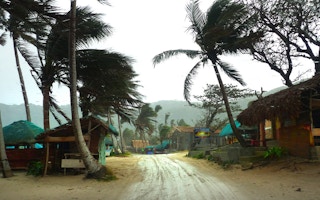Cash from wealthy countries to help the developing world tackle climate change has risen substantially in recent years, putting them on track to meet a politically important 2020 UN target to go green and adapt to wild weather, analysts said on Friday.
The amount rich nations provided themselves and raised from the private sector in 2016 exceeded US$70 billion, according to data in a biennial UN assessment. Government funding accounted for about $55 billion of that, a jump of 30 per cent in two years.
At UN climate talks in 2009, rich countries agreed to raise US$100 billion a year by 2020 to back efforts by vulnerable, poorer states to shift their economies onto a greener path and adapt to more extreme weather and rising seas.
Analysts said the figures were a positive signal ahead of next month’s UN negotiations, tasked with finalising rules to put a global accord to tackle climate change into practice.
Joe Thwaites, a researcher at the World Resources Institute, said climate finance was a “critically important part” of the 2015 Paris Agreement, because poorer countries need the money to ramp up efforts to reduce heat-trapping emissions.
As of 2016, developed nations appeared to be on track to fulfil their US$100 billion pledge, but there are concerns over whether progress has been maintained since then, he added.
After Donald Trump took power in 2017, the US president said he would not deliver two-thirds of a US$3-billion pledge made by his predecessor to the Green Climate Fund.
“
Adaptation finance is still lagging behind and needs to be scaled up, especially considering the rising climate impacts we are seeing.
Helena Wright, senior policy advisor, E3G
“Given potential backsliding in the US and Australia, and among some other countries, it’s reasonable to ask was 2016 a high watermark for climate finance?” said Thwaites.
Yet funding from international development banks rose 28 per cent between 2016 and 2017, and European Union states have maintained their contributions, he added.
However, experts said more cash continued to be spent on the push to reduce emissions by boosting renewable energy and energy efficiency rather than on coping with climate change impacts.
Adaptation - which includes measures from drought-tolerant crops and higher sea walls to protecting slum dwellers from heat - received only about a quarter of funding, analysts said.
“Adaptation finance is still lagging behind and needs to be scaled up, especially considering the rising climate impacts we are seeing,” Helena Wright, a senior policy advisor with think tank E3G, told the Thomson Reuters Foundation.
Globally, climate finance increased 17 per cent between 2013-2014 and 2015-2016, reaching US$681 billion, the report said.
Renewable energy investment dropped by 16 per cent in 2016, in part because technology costs fell, but there was an 8 per cent rise in investment in energy efficiency and a 35 per cent boost for greener transport, according to the UN figures.
Wright noted that governments continued to provide huge subsidies for the fossil fuel industry — US$373 billion in 2015.
Those should be phased out to meet political commitments, and to align finance with the Paris pact vision of a low-carbon, climate-resilient world, she added.
This story was published with permission from Thomson Reuters Foundation, the charitable arm of Thomson Reuters, that covers humanitarian news, women’s rights, trafficking, property rights, climate change and resilience. Visit http://news.trust.org)








